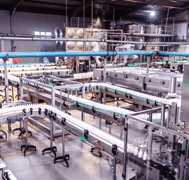
Autonomous plant and remote operations are not new concepts to the manufacturing industry.
In fact, the capabilities of autonomy and remote operations have greatly increased in recent years.
The COVID-19 pandemic is a true testament to that statement.
Disruptive digital technologies resulting from Industry 4.0 have made autonomous plants and remote operations more of a reality than the manufacturing industry could have ever dreamed.
Some of these disruptive technologies include:
- Artificial intelligence;
- Machine learning;
- Industrial Internet of Things;
- Additive manufacturing;
- And more.
What is autonomy?
According to Watson & Scheidt, autonomy is defined as systems that – without manual (human) intervention – can change their behaviour in response to unanticipated events during operations.
Autonomous systems are self-controlling, self-managing, and self-learning which offers control, adaptability, decision-making capabilities, and improvement over time.
Not only can autonomous systems work independently in the manufacturing process, but they can also work together with other systems to tackle more complex tasks.
What about an autonomous plant?
In short, an autonomous plant is a highly automated plant where the execution of most of the plant functions is carried out by systems.
This includes data collection, analysis, interpretation, process execution, decision-making, and more.
With an autonomous plant, manufacturers can focus their talent on the roles that rely on human interaction and relationship building such as supervision, management of suppliers, maintenance, and correction.
Connecting autonomy and remote operations
Autonomy and remote operations are two concepts that go hand in hand. Autonomy in manufacturing plants allows for an increase in remote operations.
Because autonomous systems are self-controlling, self-managing, and self-learning, manufacturers require fewer people on the factory floor to perform data collecting, plan and schedule processes, and conduct work.
As a result, you get increased productivity, more flexibility, and optimization of processes that can be conducted in parallel at different locations.
An autonomous manufacturing approach is more beneficial than you think
An autonomous manufacturing approach ultimately provides agility and resiliency.
Manufacturers can leverage technology to enhance employee strengths and better respond to operational needs to stay competitive.
It also improves the way manufacturers can provide custom solutions that are more precisely engineered to changing consumer and B2B demands.
Where does the journey lead us?
The road ahead towards full autonomy is a long one.
Even with the rapid advances of Industry 4.0, it will take time for autonomous systems and remote operations to make their way fully into the manufacturing industry.
While the journey might be a long one, we can help smooth out the process.
At SHEA Global, we work closely with manufacturers to develop strategies that help drive profitability, agility, and efficiency. Some of these strategies include process automation, identifying bottlenecks, and determining how to improve processes for long-term results. Contact us to learn more about how we can help!